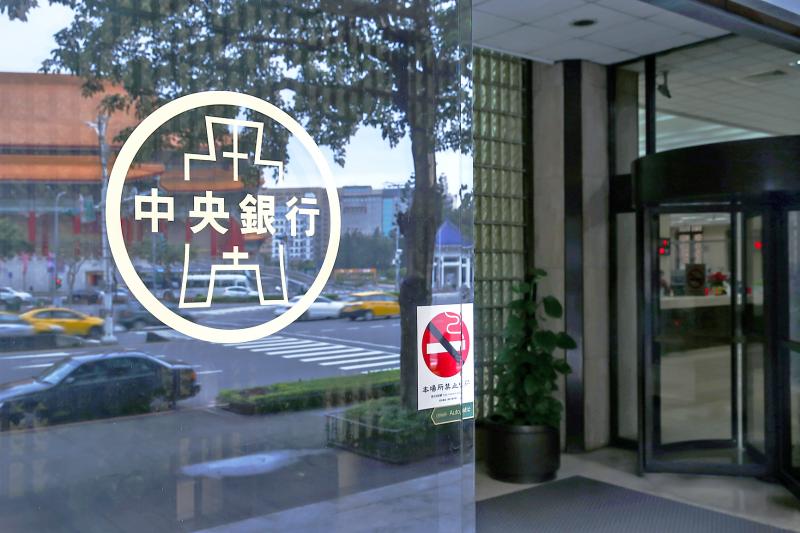Taiwan’s balance of payments had a current account surplus of US$32.19 billion last quarter, bolstered by strong exports that benefited from steady growth in global trade and economic activity, the central bank said yesterday.
The balance of payments is a sum of all transactions made with foreign entities by individuals, companies and government bodies in a country. The figure is commonly used as a reference point for monetary policymaking.
The goods trade surplus grew by US$1.63 billion to US$24.29 billion during the fourth quarter of last year, driven by sustained demand for electronics used in digital transformation and emerging technology applications, it said.

Photo: Billy H.C. Kwok, Bloomberg
Taiwan is home to the world’s largest suppliers of critical electronic components, such as advanced and mature chips.
Meanwhile, the services account surplus widened by US$2.35 billion to US$3.95 billion, mainly because freight rates soared amid lingering container shortages and port congestion, the central bank said.
The largest beneficiaries of that trend were Taiwan’s major cargo service providers, Evergreen Marine Corp (長榮海運), Yang Ming Marine Transport Corp (陽明海運) and Wan Hai Lines Ltd (萬海航運), which saw their revenue and profit skyrocket last year, a trend that continued into this year.
For the whole of last year, Taiwan’s current account surplus climbed to a historic high of US$116.12 billion, the central bank said.
The nation’s success in curbing the spread of COVID-19 helped local tech firms reap a windfall from transferred orders and led to a boom in the low-contact economy, it said.
Combined revenue at shipping companies reached US$19.2 billion, pushing up the services account surplus to US$12.31 billion, both record highs, it said.
However, Taiwan saw fund outflows jumping to an unprecedented US$104.6 billion, as local insurance companies increased stakes in overseas assets and foreign portfolio managers cut holdings in local shares by more than US$20 billion, the central bank said.
It is common for export-focused nations such as Taiwan, China, South Korea and Germany to report fund outflows, as financial institutions pursue higher investment returns in markets around the world, it said.

Quanta Computer Inc (廣達) chairman Barry Lam (林百里) is expected to share his views about the artificial intelligence (AI) industry’s prospects during his speech at the company’s 37th anniversary ceremony, as AI servers have become a new growth engine for the equipment manufacturing service provider. Lam’s speech is much anticipated, as Quanta has risen as one of the world’s major AI server suppliers. The company reported a 30 percent year-on-year growth in consolidated revenue to NT$1.41 trillion (US$43.35 billion) last year, thanks to fast-growing demand for servers, especially those with AI capabilities. The company told investors in November last year that

Intel Corp has named Tasha Chuang (莊蓓瑜) to lead Intel Taiwan in a bid to reinforce relations between the company and its Taiwanese partners. The appointment of Chuang as general manager for Intel Taiwan takes effect on Thursday, the firm said in a statement yesterday. Chuang is to lead her team in Taiwan to pursue product development and sales growth in an effort to reinforce the company’s ties with its partners and clients, Intel said. Chuang was previously in charge of managing Intel’s ties with leading Taiwanese PC brand Asustek Computer Inc (華碩), which included helping Asustek strengthen its global businesses, the company

Taiwanese suppliers to Taiwan Semiconductor Manufacturing Co. (TSMC, 台積電) are expected to follow the contract chipmaker’s step to invest in the US, but their relocation may be seven to eight years away, Minister of Economic Affairs J.W. Kuo (郭智輝) said yesterday. When asked by opposition Chinese Nationalist Party (KMT) Legislator Niu Hsu-ting (牛煦庭) in the legislature about growing concerns that TSMC’s huge investments in the US will prompt its suppliers to follow suit, Kuo said based on the chipmaker’s current limited production volume, it is unlikely to lead its supply chain to go there for now. “Unless TSMC completes its planned six

Power supply and electronic components maker Delta Electronics Inc (台達電) yesterday said it plans to ship its new 1 megawatt charging systems for electric trucks and buses in the first half of next year at the earliest. The new charging piles, which deliver up to 1 megawatt of charging power, are designed for heavy-duty electric vehicles, and support a maximum current of 1,500 amperes and output of 1,250 volts, Delta said in a news release. “If everything goes smoothly, we could begin shipping those new charging systems as early as in the first half of next year,” a company official said. The new